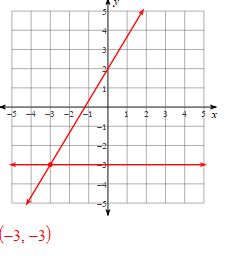Solve Using Graphing:
y = 5/3x + 2
y = -3

Solve the systems of equations using substitution:
y=2x-10
y=4x+8
(-9,-28)
Solve the systems of equations using Elimination:
-x - 5y = 4
x + 7y = -8
(6, -2)
How many solutions would a system of linear equations have if the equations are parallel and have different y-intercepts?
Zero Solutions
Solve this by graphing:
y = 2x - 4
y = -1/3 x + 3
(3,2)
3x + 7y = 14
x - 3y = -6
(0,2)
Solve the systems of equations using Elimination:
-5x-2y=26
-4x-2y=18
(-8,7)
How many solutions would a system of linear equations have if the equations are parallel and have the same y-intercept?
Infinite Solutions
x-4y=-12
3x+2y=-8
(-4,2)
Solve the systems of equations using substitution:
-8x + y = -7
16x - 2y = 14
Infinitely Many Solutions
Solve the systems of equations using Elimination:
-14x - 7y = 14
7x + 3y = -12
(-6,10)
Is there 1 solution, No solution, or Infinite solutions for the following question?
3x - y = 19
-3x + y = 10
No Solutions
-12+x=3y
-x=-3y-12
Infinite solutions
2x - 6y = 8
6x + 2y = 4
(1, -1)
Solve the systems of equations using Elimination:
100x-100y=0
70x-70y=0
Infinite solutions
How many solutions does the system have?
3y + 4x = 6
12y + 16x = 24
These are the same exact line, therefore they have
Infinite Solutions
Solve the systems of linear equations by graphing:
-8=-2y+2x
0=2+5x+y
(-1,3)
Solve the systems of equations using substitution:
8x+5y=3
-7x-6y=-1
(1,-1)
Solve the systems of equations using Elimination:
-7x+3y=-15
-4x+4y=-20
(0,-5)
How many solutions does the system have?
-6y + 2 = -4x
y - 2 = x
Different slopes
One solution
y=2/3x+1/3
y=x+2